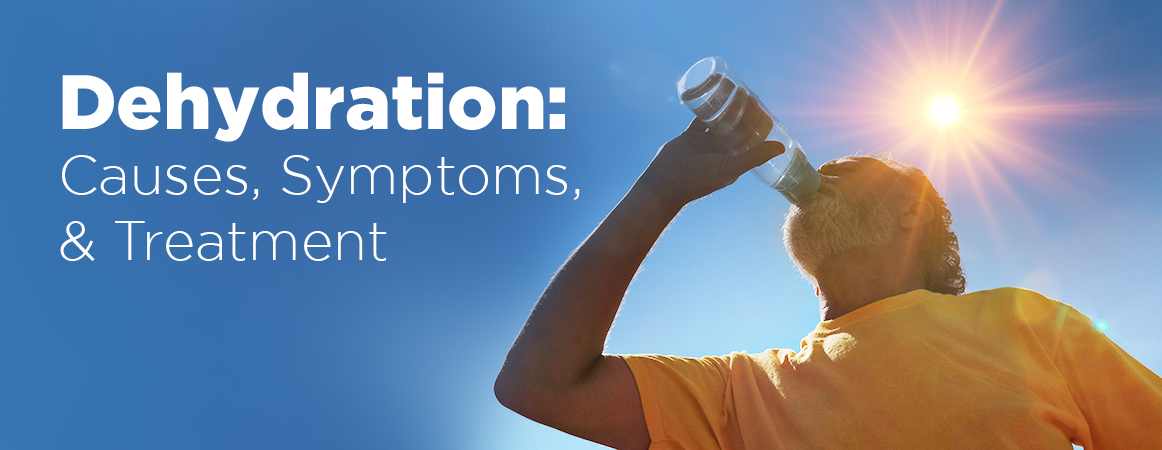Dehydration occurs when your body loses more fluids than it takes in, leading to an insufficient amount of water to carry out normal functions. It can affect anyone but is particularly dangerous for young children, older adults, and individuals with chronic illnesses. Understanding the causes, symptoms, and treatment of dehydration can help prevent severe complications.
Dehydration Causes
Dehydration can be caused by various factors, often related to an increase in fluid loss or a decrease in fluid intake. Some common dehydration causes include:
- Excessive Sweating: Engaging in vigorous physical activity, especially in hot weather, can lead to significant fluid loss through sweat.
- Diarrhea and Vomiting: These conditions can cause rapid and substantial fluid loss, making it difficult to stay hydrated.
- Fever: Elevated body temperature increases fluid loss through sweat.
- Inadequate Fluid Intake: Not drinking enough water, particularly during hot weather or illness, can quickly lead to dehydration.
- Chronic Illnesses: Conditions such as diabetes can cause increased urination, contributing to fluid loss.
- Medications: Certain medications, like diuretics, can increase urine output, leading to dehydration.
Dehydration Symptoms
Early detection of dehydration symptoms is essential for timely intervention. The severity of the symptoms varies based on the amount of fluid lost.
Mild to Moderate Dehydration Symptoms
- Thirst: An early indicator that the body needs more fluids.
- Dry Mouth and Skin: Lack of adequate moisture in the body manifests as dryness.
- Decreased Urination: Dark yellow urine and less frequent urination are signs of dehydration.
- Headache: Headaches and lightheadedness can result from dehydration.
- Fatigue: Low fluid levels can cause tiredness and reduced energy levels.
- Dry Eyes: Insufficient hydration can affect tear production, leading to dry eyes.
Severe Dehydration Symptoms
- Extreme Thirst: Intense urge to drink water.
- Very Dry Skin: Skin loses elasticity and becomes severely dry.
- Rapid Heartbeat: Increased heart rate as the body tries to maintain blood pressure.
- Rapid Breathing: Dehydration can cause shortness of breath.
- Sunken Eyes: A noticeable symptom of severe dehydration.
- Confusion and Irritability: Mental confusion and mood changes due to low fluid levels affecting brain function.
- Fainting: Severe dehydration can lead to fainting or loss of consciousness.
Dehydration Treatment
Proper dehydration treatment is essential to restore fluid balance and prevent complications. The approach to treatment varies depending on the severity of dehydration.
- Increase Fluid Intake: Drink plenty of water and oral rehydration solutions.
- Eat Hydrating Foods: Choose fruits and vegetables that are high in water content.
- Get Medical Help: If you’re severely dehydrated, get help right away.
- IV Fluids: Administer intravenous fluids for rapid rehydration in severe cases.
In case of severe dehydration, Head to the MMI hospital near you and seek immediate medical attention.
Mild to Moderate Dehydration Treatment
- Increase Fluid Intake: Drinking water is the most straightforward way to rehydrate. Oral rehydration solutions (ORS) containing electrolytes can be particularly effective.
- Eat Hydrating Foods: Consuming fruits and vegetables with high water content, such as cucumbers, oranges, and watermelon, can help replenish fluids.
- Avoid Caffeine and Alcohol: These can increase fluid loss and worsen dehydration.
Severe Dehydration Treatment
- Seek Medical Attention: Severe dehydration requires immediate medical intervention.
- Intravenous (IV) Fluids: IV fluids are often necessary to quickly restore fluid levels and electrolytes in cases of severe dehydration.
- Monitor and Manage Underlying Conditions: Chronic illnesses or other health issues contributing to dehydration need to be addressed and managed effectively.
Preventing Dehydration
Prevention is always better than cure. These are some pointers for avoiding dehydration:
- Drink Adequate Water: Ensure regular water intake, especially during hot weather or while exercising.
- Monitor Fluid Loss: Pay attention to signs of fluid loss, such as sweating and increased urination, and compensate accordingly.
- Hydrate Before Exercise: Drink fluids before, during, and after physical activity.
- Climate Adjustment: To avoid dehydration in hot and muggy weather, drink more fluids.
Conclusion:
Understanding dehydration causes, recognizing dehydration symptoms, and knowing the appropriate dehydration treatment are essential steps in maintaining optimal health. By staying informed and proactive, you can effectively prevent and manage dehydration, ensuring your body remains well-hydrated and functional.
